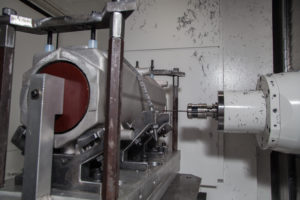 Having built its reputation in high-volume precision pressing, Quality Engineered Products took the decision eight years ago to move into the competitive world of sub-contract precision machining. The company, based in Cinderford (UK), started out with vertical machining centres and CNC lathes. Then, in 2015, a major investment in state-of-the-art machine tools provided the opportunity to fully exploit technology and make significant gains.
Having built its reputation in high-volume precision pressing, Quality Engineered Products took the decision eight years ago to move into the competitive world of sub-contract precision machining. The company, based in Cinderford (UK), started out with vertical machining centres and CNC lathes. Then, in 2015, a major investment in state-of-the-art machine tools provided the opportunity to fully exploit technology and make significant gains.
While it is all very well having the latest machine tools, such as Quality Engineered Products’ (QEP) recently installed Mazak Nexus III Series horizontal machining centre and Mazak Integrex i-200 multi-tasking machine, maximising their efficiency requires more detailed development of the machining process. Having won a major contract to machine a range of sand-cast aluminium parts for its customer Cannop Foundry, the time was right for QEP to maximise the potential of its Renishaw probing systems.
QEP was already familiar with probing, having used it on its vertical machining centres (VMCs) for the past four years. Manufacturing Director, Dave Marfell, was looking to take its application to new levels and use Renishaw probing not only for tool setting, but for part alignment before machining and in-process gauging. The time savings that this would generate equate to almost 20 weeks of production annually.
An example of this difficulty is highlighted in the first probing procedure, that of tool setting. QEP – like many other manufacturing businesses – previously set tools manually on the machine, using feeler gauges to set lengths against datum points on the part or machine and trusting the tool manufacturer for diameter data. This information then had to be manually input into the machine control and offsets set. In all, Dave Marfell suggests that each tool could take up to six minutes to set, with typically 15 tools – a mixture of drills, end mills and indexable cutters – in each set-up. QEP now uses both Renishaw NC4 non-contact and TS27R contact tool setting probes, capable of ±0.10 µm 2σ and 1.00 µm 2σ repeatability respectively.
Now each tool probing cycle (including diameter measurement) takes less than 30 seconds, and every tool can be checked in quick succession, with data being transferred automatically to the CNC. Another major benefit of on-machine tool setting is the elimination of human error.
The next stage of developing the Renishaw probing sequence came through the contract with Cannop Foundry. The requirement was to machine a range of aluminium sand-cast components in five different designs, with typically 50-off per batch. Cannop Foundry supplied the fixturing along with its method of setting the castings, which can vary due to the sand casting process. This method involved a high degree of manual intervention using setting plates and a reliance on the operator to ‘get it right’, as well as being time consuming.
With tools and part set, attention turned to inspection. QEP’s routine was to check 1 in 10 parts on a co-ordinate measuring machine (CMM), a process that would take at least 30 minutes. While this part was being checked they had two options; to stop the machine until the part had been verified, or to carry on machining and ‘quarantine’ parts until the sample had been checked. Both have their obvious drawbacks.
Being accredited to AS9100 and working with diverse industries including aerospace, marine, and automotive, validation of all of its processes comes as second nature to QEP. It has put in place procedures to ensure that what it does with its Renishaw probing systems is fully documented and appraised on a regular basis.
In fully embracing the potential offered by the use of Renishaw probing systems QEP has achieved its aims of maximising labour hours by eliminating unnecessary human intervention, removing bottlenecks around the CMM inspection process, and reducing scrap and potential rework of parts. QEP’s production levels are typical of many hundreds of sub-contract machine shops around the world; where it differs is in its willingness to exploit technology to maximise productivity.


